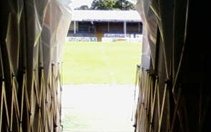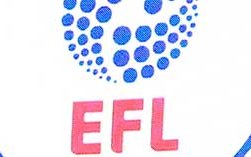The Long Goodbye: Embrace or deny a new era?
“The character of Layer Road may be lost forever but the move should mark an end to decades of struggle.” – former U`s Press Officer, Colin Wood.
Time has not rewound at Colchester United Football Club this summer, but a saying of ’60s Britain still applies: if you do not go to the revolution, the revolution will come to you. Tables and chairs, bricks and mortar and long-standing traditions have all flipped as the present drags United from that alternative galaxy of Layer Road towards the here and now. Can you ignore a new dawn`s call?
Posters of Karl Duguid, ex-skipper, are pulled down like some sketchy Soviet cover-up, to make the masses forget a former love. The old stadium, plus her more meagre trophies, have been sold, easy as putting salt on a slug, and the club`s long-serving programme-seller, Chris Rout, has folded his stall for one last time. Bags have been packed, in other words; nostalgia shut in a box, albeit kicking-and-screaming, sometimes.
Old father Colchester has awaited his move to Cuckoo Farm for more than 35 years, meantime working a way back from the map`s edge of football`s forgotten lands. As the calendar dissolves into August, what remains beyond dispute amid the changes is that United will no longer be able to revel in its end-of-the-line hell-hole status.
That`s the blessing and the curse – the Catch-22. ‘Layer Drome` was sporting nature untamed – not for this place, the media circus. Football`s last stop functioned as a law unto itself, symbolising both daunting outpost and bastion of virtue. Nobody liked it there, yet everybody did. Both feared and revered at once is a most powerful sporting cocktail.
The move, though, is of wider significance than a simple demolition of the past. It is the reverse, actually, because it alters the future; it is Colchester United catching-up on jet lag. Nearly fifteen years after Manchester United lead the market by first coining and cashing-in on the equation that crazy fandom equals big profits, Colchester`s own United are finally upsizing.
True, U`s wallpaper, ticket-stubs and authentic mugs have long been dealt from porter-cabin offices. Today, however, the club talks of hosting events outside football`s traditional remit, for the benefit of the community: concerts, drinks-parties, and corporate occasions.
That part of the switch is alien to the seasoned U`s watchers in Essex. Highly contentious, yes, but the change-over is hardly debatable. Like it or not, the council`s £16 million and rising investment of public money on the project makes Cuckoo Farm everyone`s valid hot-topic. Besides, building an entire complex exclusively for twice-weekly football alone would amount to making a money bonfire.
What the most ardent of U`s fans are still disputing is the moral cost of such a quick displacement, or what they may see as an irreversible trend, vandalising values as well as the spirit of Layer Road.
Withdrawing bygones began as a metaphorical fear only but apparently took shape in reality during the club`s recent auction of the old site and escalated into a full-blown neurosis when Bob Russell, MP, accused Colchester of “air-brushing history”.
Selling previously-won silverware caused most rumpus, but Russell made the noble gesture of buying some of it back, with a view to re-housing it at the new ground; if he ever returns, that is. Russell has not renewed his season-ticket for the first time in 51 years over this disagreement, and other club matters, such as a lack of Supporters` Association bar at Cuckoo Farm. The wishes of fans at large have been overlooked, he says.
A moral victory scored there, you might think, or maybe just one man in a pointless ritual that denies him the pleasure of watching his own football team. Either way, the word is that many like-minded regulars have also declined to buy a guaranteed seat at home matches next season. They are unwilling to pay the new order through the nose for a match-day pass on grounds that all democracy has been surrendered since Robbie Cowling flew into the hot-seat.
If this is you, then listen carefully, because the news-flash for Colchester United`s purists is that the club was always going to play evolution`s version of Risk: adapt or die. Cowling brought dynamism with him, too, and anyone under the misguided impression that they have lost their constitutional voice should look at how the backlash from fans kept gate fees for the new campaign at acceptable levels.
As for the notion that things have changed all-of-a-sudden, at the push of a button and click of a finger, that is actually just a trick of the mind. Life works on a far more discreet scale, but the silent encroachment is always what takes us by surprise.
This revolution has been coming, then. It always has. Even those choosing not to embrace it will be unable to ignore Colchester United`s changing times. The harder you run the closer it all seems to get.
“When you`re disappointed kids shuffle on to the air-conditioned park and ride bus, moaning about you taking them to the football instead of the cinema – you can tell them how you gladly stood in a sweaty, heaving crowd on the Layer Road turf, waiting, baying for a glimpse of the promotion-winning Conference team; or sang until you were hoarse outside the Town Hall for the League One promotion-winners.” – Popular match-day columnist, CarbonDioxide.
U`s Your Head
The detractors keep saying Colchester United have 10,000 shiny seats in their new stadium, but not enough fans to sit in them.
Yet, the record-books show the U`s took 26,000 to Wembley, and that was in 1992 for the F.A. Trophy Final. You do the maths.
Lies. Damn Lies. And The Sixties.
After speaking of Colchester United`s nostalgia so routinely this summer, please forgive this column a digression of national significance, for it seems some people cannot remember the ’60s, even if they were there. This country`s recent past, from that supposed ‘golden` era, endures in a hallowed light because of the Beatles, hippies and a psychedelically intriguing Carnaby Street.
Football prolongs the everything-was-fantastic myth because England won the World Cup in `66, with photographs proving men in cloth caps still existed, too. That the day`s hat-trick-scorer, Geoff Hurst, was allowed to mow his lawn without press intrusion next day practically sealed the whole story as free from destruction from HMS Hindsight.
Until now, that is. Nick Hornby`s brilliant Fever Pitch tells of the writer`s formative afternoons on the terraces of Arsenal`s now-defunct Highbury, circa 1960, where a suburban schoolboy learnt football`s occasionally warped ethics amongst a sea of hard-knocks, knuckle-sandwiches and swearword-strewn skies.
The book, first published in the nineties, erodes some of that sepia-toned fakery which still sticks to the time of England`s only World Cup win yet. It`s RIP those swingin` ‘sixties, then. Read it yourself, if you don`t believe me.
Article by Matt Calmus.
We want to know YOUR thoughts…
VITAL COLCHESTER IS 100% UNOFFICIAL – FOR THE FANS, BY THE FANS
Share this article
Related Articles
4 comments
Comments are closed.




Nice Article Stevie mate!
Cheers, but it wasn’t me, was by Matt_Us! lol
Ah ok we done Matt, there is a section in the admin page where as you can put a different name mate, I take it matt is home from Uni then?
Yeah he was round, we just forgot what admin we were in! lol